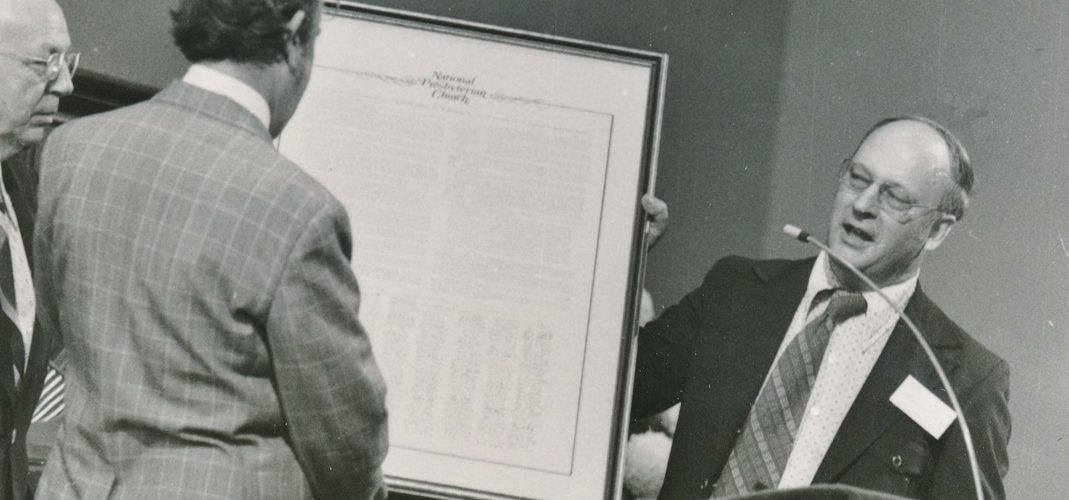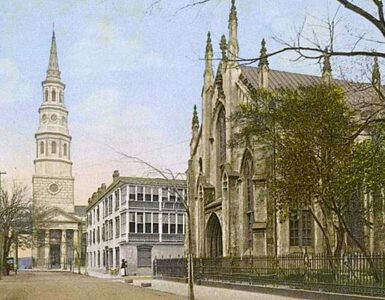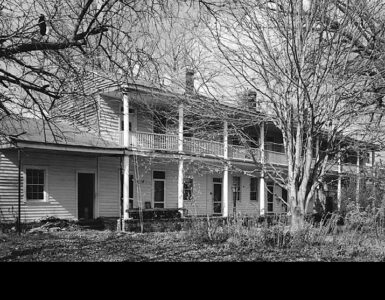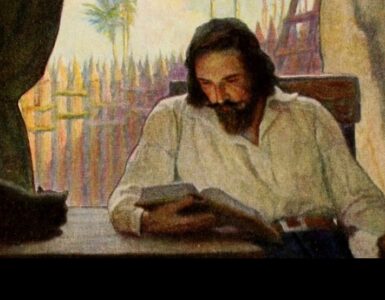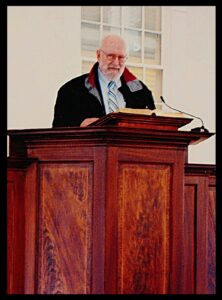 The above photograph is provided by the PCA Historical Center and was taken during the Second General Assembly of the Presbyterian Church in America (PCA) in 1974. It shows Stated Clerk Morton H. Smith at the podium presenting a framed copy of the document “A Message to All the Churches of Jesus Christ” to the moderator of the first general assembly, Ruling Elder Jack Williamson. The man at the left edge is Teaching Elder Erskine L. Jackson. The poster-size document includes the signatures of 296 of more than 330 attendees of the first assembly. The document is a remembrance of the forming of the PCA that was distributed by the J. Ligon Duncan family of Greenville, South Carolina. The 50th General Assembly of the Presbyterian Church in America declared “A Message to All Churches of Jesus Christ” a faithful expression of Biblical polity that shaped the founding of the denomination in 1973.
The above photograph is provided by the PCA Historical Center and was taken during the Second General Assembly of the Presbyterian Church in America (PCA) in 1974. It shows Stated Clerk Morton H. Smith at the podium presenting a framed copy of the document “A Message to All the Churches of Jesus Christ” to the moderator of the first general assembly, Ruling Elder Jack Williamson. The man at the left edge is Teaching Elder Erskine L. Jackson. The poster-size document includes the signatures of 296 of more than 330 attendees of the first assembly. The document is a remembrance of the forming of the PCA that was distributed by the J. Ligon Duncan family of Greenville, South Carolina. The 50th General Assembly of the Presbyterian Church in America declared “A Message to All Churches of Jesus Christ” a faithful expression of Biblical polity that shaped the founding of the denomination in 1973.
Morton Howison was born in Roanoke, Virginia, to James Brookes and Margaret Morton (Howison) Smith on December 11, 1923. The family moved during his youth to Baltimore where he attended Mount Washington Presbyterian Church, PCUS. A significant influence in his life spiritually was pastor Jame E. Moore. When the time for college arrived, he began at the University of Michigan but graduation was delayed by service to his country flying B-17s and training pilots for the Army Air Corps (Air Force). In later years he would continue to fly and own his own aircraft. When he returned to civilian status he continued studies for a year at the University of North Carolina before returning to Michigan to complete his degree. Indicative of the situation for theological education within the Presbyterian seminaries was his beginning seminary studies at Columbia in Decatur but then due to dissatisfaction with the theological direction of the curriculum he transferred to Westminster Seminary in Philadelphia for the second year. He especially appreciated professor John Murray, who taught systematic theology, and apologetics professor Cornelius Van Til, however, given the situation within the PCUS he was advised that ordination examinations as a graduate of a denominational seminary would smooth the examnation process for his work in ministry.
After graduation, licensure, and ordination he served a brief pastoral call in Maryland before transitioning to education as the head of the department of Bible at Belhaven College in Jackson, Mississippi. It was a significant time for the college because it would become coeducational in the fall of 1954, which would be when Smith began teaching. He not only taught college students but also local residents in night classes on subjects including Presbyterian doctrine and the Bible. To continue in teaching, he recognized the need for doctoral studies and received a Fulbright Scholarship to study in the Netherlands, 1958-1959, at the Free University of Amsterdam. His research about Presbyterian theology in the South would be directed by G. C. Berkouwer. The Free University seems an unusual choice for a doctorate given Smith’s southern interest, but R. C. Sproul went to the Free University because his mentor John Gerstner said it would be best to study with Berkouwer. Possibly a mentor or friend counseled Smith with similar advice. Smith achieved doctorandus in 1959 (i.e. all but dissertation, sort of), then received the Th.D. (Doctor of Theology) in 1962 upon successful defense of his dissertation. Defending a dissertation in the Netherlands was a formal event with faculty in their regalia sitting as judges at the bench and the possibly nervous Smith was likewise dressed. The dissertation had been published as a book before the defense which provided access for critical reflection not only for faculty but others as well (see Select Bibliography).
Rev. Morton H. Smith, Th.D. continued at Belhaven until the fall of 1963 when he left to become a guest lecturer in practical theology at Westminster Seminary for a year. He preached for the morning service of the annual day of prayer about “A Minister’s Self Examination,” from John 21:15, then in the evening the subject was “The Kingship of Christ.” On November 22, President John F. Kennedy was assassinated by Lee Harvey Oswald and Dr. Smith was given the difficult task of delivering a memorial to the seminary community. He concluded the brief discourse saying,
May the assassination become a turning point in the history of our nation. May we turn from the pagan secularization that has been so dominant in our culture in recent years. May we turn from the lowered morality which is so prevalent in our nation today. May we turn from a spirit of bitterness toward those with whom we disagree to a spirit of love and understanding of our fellow man. Let us as Christians lead our nation in repentance, and in a return from our sinful ways to the God of our fathers, and so let us learn to rejoice in this tribulation that has come upon us. (The Presbyterian Guardian, Dec. 1963, p. 167)
These thoughts expressed by Dr. Smith are as timely today as when they were given sixty-two years ago.
The situation with the denominational seminaries concerning the doctrine of Scripture and adherence to the Westminster Standards had deteriorated sufficiently that some Presbyterians believed an independent school was needed and their vision came to form as Reformed Theological Institute (RTI). The new school opened at French Camp, Mississippi, with Dr. Smith the professor of theology. The vision for RTI was to have “a positive institutional and educational promotion of the theological and Biblical point of view which we believe to be that of the founding fathers of the Presbyterian Church” and to “promote Scripturally directed learning and scholarly enterprises” and have “a school of theology committed to the full authority and infallibility of the Scriptures, and to the Westminster Confession of Faith and the Larger and Shorter Catechisms” (Clarion Ledger, July 18, 1964, p. 8; May 5, 1964,·p. 4). However, the independent institute faced location challenges because RTI was soon moved from French Camp to Kosciusko and then finally settled on the current campus in Jackson with the new name Reformed Theological Seminary. No proof was located, but the guess is that those who founded RTI believed that use of the term institute was better than seminary because it would be less threatening to the denominational seminaries and thereby less likely to illicit judicatory action. Morton Smith was the first faculty member and in later years he would become the chairman of the department of systematic theology. However, just as biblical-confessional theological education required a new seminary, concerned Presbyterians would come to realize the need for a new denomination.
In the earliest days of dissatisfaction with the direction of the denomination there were several church members who joined together to seek a solution, Dr. Smith was one of these leaders. His conviction and abilities led to his election as the first stated clerk, serving initially part-time, then full-time. Indicative of the respect for Dr. Smith’s scholarship and acceptance of the PCA by other reformed churches is his selection to join an impressive group of speakers that included among others J. I. Packer, Jay E. Adams, Paul G. Settle, Edmund P. Clowney, Robert G. Rayburn, W. Robert Godfrey, John R. deWitt, James Boice, Richard Gaffin, R. C. Sproul, and William S. Barker at the National Presbyterian and Reformed Congress in 1979 where he delivered the lecture, “On the Unity of the Bible.” He continued as stated clerk until he resigned in 1988. He was at the retirement age of 65, but he still had special plans as he returned to work in education.
In 1987 while bringing his work as stated clerk to a close, Greenville Presbyterian Theological Seminary was opened in South Carolina with Dr. Smith the dean and professor of systematic theology. His vision for the seminary was training pastors using curriculum that is centered around the infallible Word and its interpretation governed by full adherence to the summary of essential doctrine found in the Westminster Standards. The term Dr. Smith would have used is an Old School seminary. His vision has continued with faculty and students gathering at the current campus in the attractively renovated Old Taylors High School. In the year 2000 when the General Assembly met in Tampa he was honored by grateful elders electing him moderator of the 28th General Assembly of the PCA. Reverend Morton Howison Smith, Th. D., passed away on Sunday, November 12, at 10:55 AM. How appropriate that he rested from his earthly work on the day of the week God established for his image bearers to rest just as He had rested from the work of creation.
Barry Waugh
Select Bibliography
A Brief History of Subscription to the Creeds and Confessions with Particular Reference to Presbyterian Churches (Taylors: Greenville Presbyterian Theological Seminary, 2002); 67 page pamphlet.
Equipping Preachers, Pastors, and Churchmen, Zachary Groff, ed. (Greenville: Greenville Presbyterian Theological Seminary, 2017); authors of this collection of essays include former and present seminary faculty.
Harmony of the Westminster Confession and Catechisms has been published in at least six editions, sixth 1999, with the first edition apparently issued in 1990 by Greenville Seminary Press; this is an invaluable tool for studying the Westminster Standards. It was also issued by Southern Presbyterian Press in 2010.
How is the Gold become Dim: The Decline of the Presbyterian Church, U.S., As Reflected in Its Assembly Actions (Jackson: The Steering Committee for a Continuing Presbyterian Church, 1973); Dr. Smith was tasked by the Steering Committee to study the assembly minutes and compile documentation regarding the doctrinal decline of the denomination. His findings are accompanied by several important appendices.
Reformed Evangelism (Clinton: Multi-Communication Ministries, 1975); 32 page pamphlet.
Regulative Principle of Worship: Is it Biblical? (Greenville: Greenville Presbyterian Theological Seminary, 1995); 22 page pamphlet.
Southern Reformed Theology, David F. Wells, ed. (Grand Rapids: Baker Book House, 1989); Dr. Smith wrote the entry, “Southern Tradition”; the introduction is by George M. Marsden with articles on Robert L. Dabney by Douglas F. Kelly, and James H. Thornwell by Luder G. Whitlock, Jr.
Studies in Southern Presbyterian Theology, (Amsterdam: Drukkerij en Uitgeverrij Jacob Van Campen, 1962); this is Smith’s dissertation as available for review for his defense at the Free University. The PCA Historical Center has a copy of this edition. The book, out of print, was issued by P&R with the same title in paperback in 1987; an eBook edition is available currently.
Subscription Debate: Studies in Presbyterian Polity (Greenville: Greenville Presbyterian Theological Seminary, 1994).
Systematic Theology, vol. 1, Prolegomena, Theology, Anthropology, Christology, vol. 2, Soteriology, Ecclesiology, Eschatology (Greenville: Greenville Seminary Press, 1994); this set was reprinted by Wipf & Stock Publishers in 2019.
Testimony: An Introduction to Christian Doctrine (Philadelphia: Great Commission Publications, 1986).
Notes—Wayne Sparkman is the director of the PCA Historical Center which is located in St. Louis, Missouri. The color photograph is the author’s. General information was gleaned from Jackson, Mississippi’s Clarion Ledger, and Greenville, South Carolina’s The Greenville News for the respective eras of Dr. Smith’s residency in those locations. It is suggested that you read the memorial by President Emeritus of GPTS, Joseph A. Pipa, who includes more personal information from his years of contact with Dr. Smith. Go to Ref 21, November 13, 2017, “Remembering Dr. Morton H. Smith”; I have used some of his information in this post.


